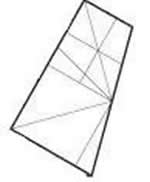When we learn manual origami, we often make origami based on regular hexagons. Many newcomers may encounter this problem - how to make hexagons from square paper? Share 3 illustrated tutorials on how to get regular hexagonal paper. I hope it will be helpful to everyone~
[How to make hexagonal paper 1]

Step 1. Take a square piece of origami paper.

Step 2. Fold the lower edge of the origami paper in half once upward.

Step 3. Make quarter creases on the folded origami paper.


Step 4. Using the bottom point of the center line as the axis, fold the right origami towards the 1/4 crease line of the left origami. After folding the right origami over, align the vertex with the 1/4 crease line.

Step 5. Fold the origami paper on the left toward the back with the bottom point of the center line as the axis. After folding, the origami graphics overlap and are symmetrical.

Step 6. On the newly formed figure, draw a straight line and mark the intersection between the front and rear vertices and the edge (the lower point).

Step 7. Cut off the excess part along the marked line and unfold it.

Step 8: Regular hexagon origami completed!

[How to make hexagonal paper 2]

1. Make a regular hexagon from square paper
1. Fold in half to form two vertical and horizontal center lines, and fold the lower part toward the horizontal center line. The remaining creases are four horizontal lines. This crease will be used in step 3;
2. Fold the bottom edge upward;
3. Fold the two points above toward the center and fall on the quarter line obtained in step 1. The folds are the two sides of the regular hexagon. This is also called a 60-degree fold;
4. Fold the midpoint of the upper edge to the lower left so that it falls on the quarter line. The crease intersects the side of a hexagon obtained in the previous step to obtain an intersection point. Do the same on the right side. After completion , another intersection point is obtained, fold it horizontally along these two intersection points, and another side of the hexagon comes out; expand it as shown in Figure 5. The shaded area in Figure 6 is a regular hexagon.

2. Use A4 paper to fold a regular hexagon
1. Quarter;
2. Fold the two points above toward the center and fall on the quarter line obtained in step 1. The folds are the two sides of the regular hexagon. This is also called a 60-degree fold;
3. Fold the creases obtained in the previous step upward and downward respectively;
4. Fold the crease obtained in the previous step to the right, and fold the upper and lower sides respectively; the shadow in Figure 6 is a regular hexagon.

[How to make hexagonal paper three]


1. First fold the paper in half up and down. As shown in the picture after completion.


2. Unfold the paper, and then fold the left and right sides in half, as shown below.


3. Next, fold the right side toward the midline, as shown below. (Please try to partially fold)


4. After unfolding, fold the top edge toward the center line, as shown in the picture after completion. (Please try to partially fold)

5. Then unfold it and fold the lower left and upper right corners opposite each other.


6. Then fold the paper up and down according to the crease as shown in the picture. (No need to be too precise)


7. After unfolding, fold left and right according to the new dotted line as shown in the picture.

8. Then fold back the two small triangles corresponding to the two lines just folded.

9. Then fold the two parts up and down according to the crease close to the midline.

10. Then fold the lower left corner to the back as shown in the crease.

11. Then expand it and you can see the picture below.


12. Continue to fold the lower right corner to the back as shown in the picture.

13. Then fold the lower part up according to the crease.

14. Then fold the upper left corner to the back according to the crease as shown in the picture.

15.As shown in the figure after expansion.

16. Then fold the upper left corner back according to the crease as shown in the picture.

17. The final result will be as shown in the figure, just subtract the excess according to the creases.

























